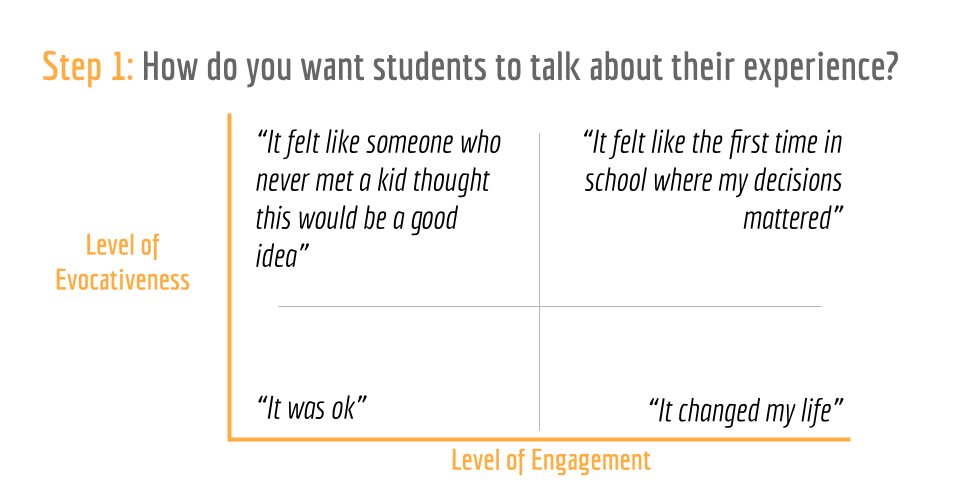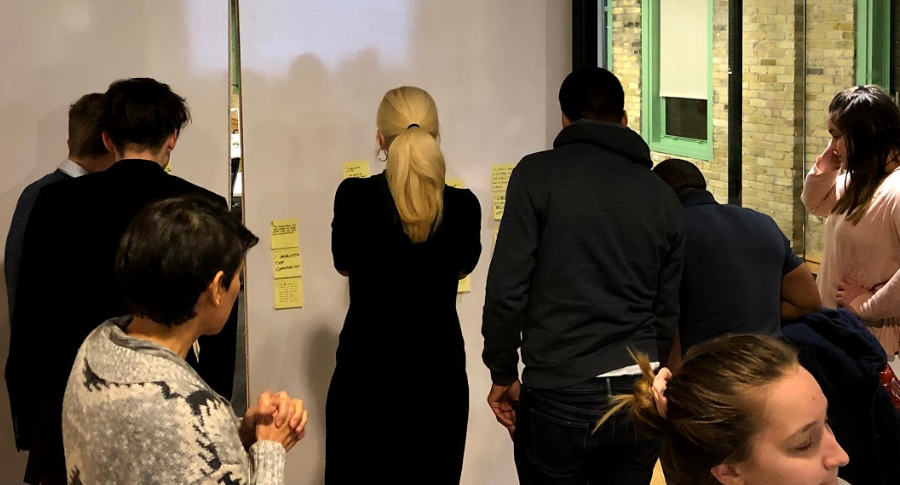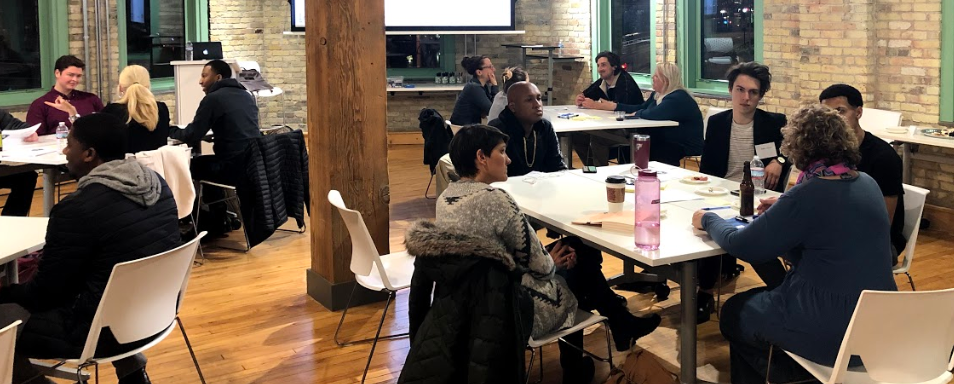Our December Collab Lab focused on student run enterprises. We were interested in the kinds of experiences participants hoped students might gain through participation in a student run enterprise.
Our process for the session took a slightly different approach, starting with how we wanted to students to talk about their experience. Our goal was statements that demonstrate a high level of engagement, but are also evocative enough that we could start to imagine how a student run enterprise might foster such an experience.

The initial brainstorming process generated a long list of experience statements, including:
- “I worked really hard because the results really mattered”
- “This program helped me find my passion.”
- “The work here is important to me personally.”
- “I’m glad I can be myself, express my mind freely.”
- “I got to know myself better.”
- “I grew as a person.”
- “It was my favorite class ever.”
- “I never thought I could do this.”
- (with pride) “This is my project!”
- “I chose to stay because of this.”
- “I was able to make decisions that allowed me to take risks and learn from mistakes to help our business be more successful.”
- “I learned how to fail.”
- “There are real consequences for my actions in this enterprises.”
- “I felt more empowered than ever.”
- “This experience allowed me to really own my learning and let me take something I am interested in to a level I couldn’t have done without this experience.”
- “I have a voice and I have value.”
- “I understand my role.”
- “I am proud of what exists here.”
- “I am valuable to this business.”
- “This experience helped me see how a business could not only help me but help the community.”
- “The experiences I’ve had make me think about what I can do to help my community.”
- “This experience allowed me to grow as a student leader and collaborate with others.”
- “I have a better understanding of money, how it is created, and whether or not it has value.”
- “I used the skills I acquired to further my knowledge and abilities.”
- “I remembered doing this activity in class and could apply the technique learned to help myself.”
- “This helped me learn how to apply my skills in the real world.”
- “As a person, it made me make better decisions. As a member of my community it made me open my eyes and grow up.”
- “It helped me figure out what I want to do with my life.”

With that list in hand, we asked participants to form small teams to talk through ideas for how a student run enterprise might help students have one or more of those experiences. Our second process change was to have these ideas expressed as “What if we…” questions. We wanted to see if that led to more expansive thinking. Here’s what they came up with:

Individuality Initiative
We hope students might say…
- “I learned to fail”
- “This program helped me find my passion”
- “I have a voice. I have value.”
What if we…
- created an environment where students weren’t as fearful of failing, but instead were encouraged to learn from their failures ;
- created a survey or interview process to identify appropriate enterprises and their roles within them;
- encouraged an education system that catered to helping students find their passion instead of telling them what they should be?
Failing with Open Minds
We hope students might say…
- “I learned to fail”
- “I found my passion”
What if we…
- allowed kids to fail;
- allowed kids to pursue their passion and explore themselves;
- sourced innovation from kids?
- encouraged all to fail of front of an authentic, receptive audience with an open mind while pursuing a curiosity which can become a passion after taking a risk?
Sustainable Futures/Business with an Impact
We hope students might say…
“This experience connects passion to community and allows us to thing about our impact”
What if we…
- challenge them to make a product or service that helps the environment or community;
- challenges them to create a business or product that reduces their impact on the environment;
- create a business that would help their specific neighborhood issue?
Change Agent
We hope students might say…
“I feel more empowered than ever”
What if …
- this purpose already means something to me;
- I am interested to lead;
- we make the community better?
Milwaukee Made
We hope students might say…
“It was so great to work with other students of all ages and to make money and learn how to be successful in a business.”
What if we…
- break down barriers to students creating a business;
- we worked with an elementary school, high school, and college to create a store/experience for students to learn from each other to make a real business;
- raised confidence and creativity through working with college professors and students in collaboration;
- used the new Marquette space in Schlitz Park to sell the produces of student enterprises and employ high school students to work in the store/paid students for the products they sell;
- collaborate with Marquette, MATC, Pathways High & Golda Meir to do so?
Try – Fail – Reflect (repeat)
We hope students might say…
“I learned how to fail.”
What if we…
- take time to reflect after failure;
- normalized failure;
- push students outside of their comfort zone?
Thanks to The Commons for providing the space and to our featured participants for sharing their expertise and ideas:
Que El-Amin — Co founder Young Enterprising Society
Claire Friona — Co-founder of Agricycle Global
Jill Hughes — Senior Business Academy instructor, Menomonee Falls High School
Owen Raisch — Associate Director, Student-Run Business Program at Marquette University

